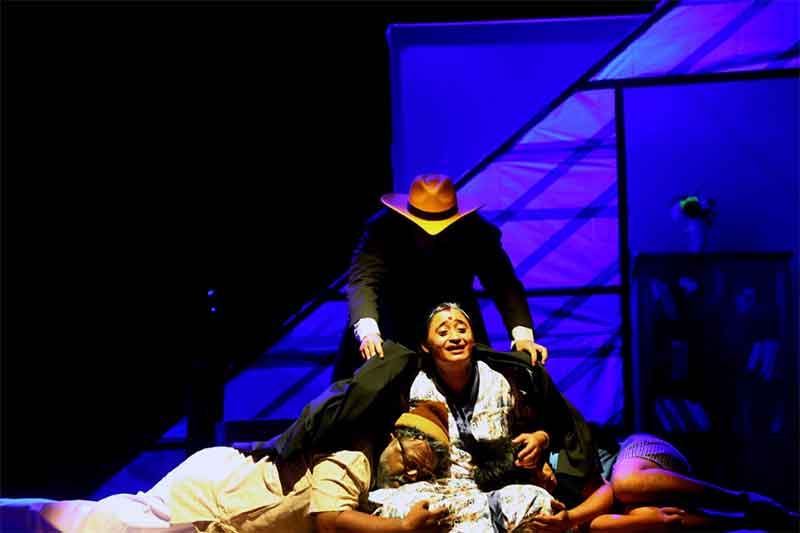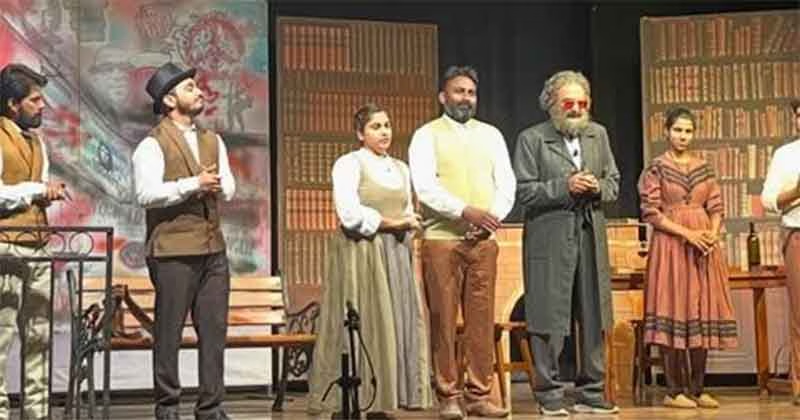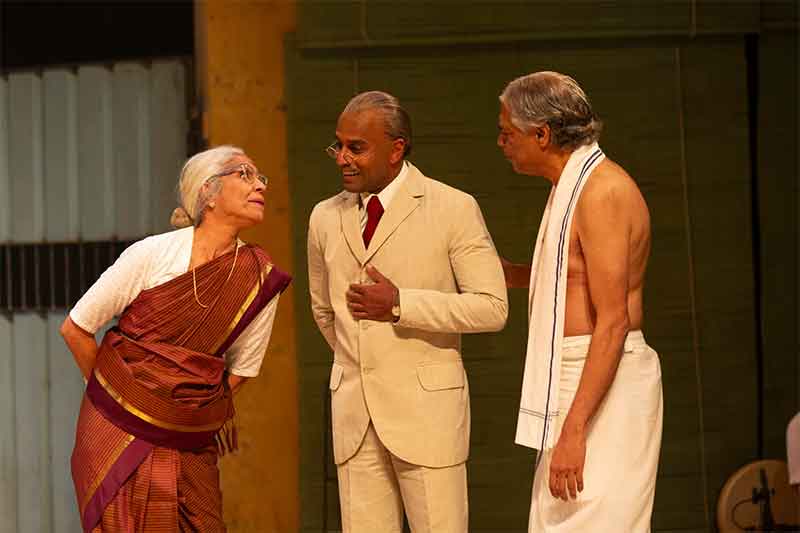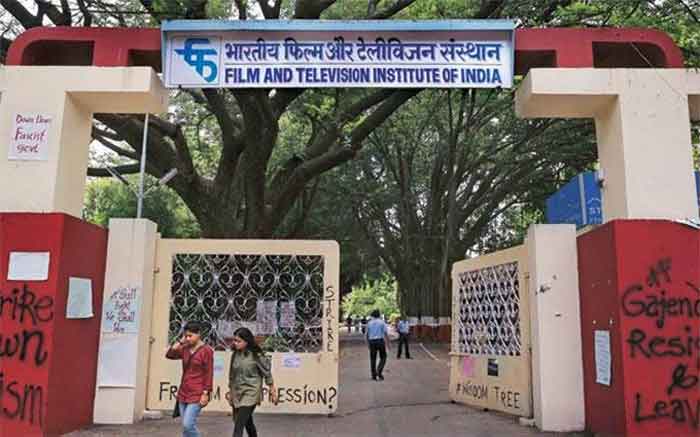
Artists at National School of Drama performed Hillol Kumar Pathak’s Madhumokhika at the theatre festival Bharat Rang Mahotsav. Madhumokhika, the play, isn’t just about surrealism intrigued smoothly into the mundane everydayness of a housewife but also about the revelation of what is in between, horror of aspiration, conflict of modernities, and everything operating within the vicious apparatus of patriarchy.
The story starts when an actress falls in love with her counterpart during a play where she plays the role of chameli and him as a colonial hunter. The green room romance that follows afterward between them isn’t just love, but the relationship through which the actress dreams of becoming ‘heroine’. But after marriage, her life falls into misery as the husband seems distant, and she is left with a schizophrenic father-in-law and brother-in-law with unidentified mental illness.
Aspiration is the first step of the ladder that can get us to places, and similar was the case with Madhu, female protagonist. But in a society that views Sisyphus’s life as condemnation to endless rock rolling, it is hard for us being a part of that society to imagine the unaccomplished life of Sisyphus happy who is still rolling a rock somewhere. Therefore it becomes quite obvious that the other side of life post-accomplishment isn’t as envisioned but carries the complexity of a new reality. However after the 1990s, changes in the society made workaholism take over alcoholism and the awareness was getting blurred as the package of ‘recreational activities’ was made accessible to the middle class. This middle class now is okay with doing seventy hours of work per week when recreational activities are at disposal. Thus, corporatization of dreams starts where thinking to be nothing becomes anti-global(ization) which is evident from the fact that Self help books are hijacking the bookstores. The problem is not with India dreaming, but how unattainable these dreams are for those who are the victims of caste, gender and other forms of atrocities. Thus, the play brings the politics within aspiration which new India should have a look at, as the protagonist can only aspire fame through a man.
This way of aspiration changes the overall meaning of art which earlier used to focus on polishing the craft but now is a medium of making way to a big budget cinema. So the art which used to have a social commitment now runs on how sensational and algorithm friendly it is. When people like Piyush Mishra from writing lines like Woh Eid ki Eidi, Lambi Namazein Sevaiyon ki Jhalar, Woh Diwali ke, Diye Sange mein, Baishakhi ke Badal in his song Husna, grieving over partition went to make a movie like JNU (Jahangir National University) where he resorts to vilification. Or Urvarshi Rautela coming with absurd interpretation of events just to remain talk of the town, like suggesting link between herself and AR Rahman’s song Urvashi from Tamil movie Kadhalan giving statement like “Honoured to be that first Indian actress to have Ed Sheeran and AR Rahman sing about me.. greatness always attracts greatness”. Urvarshi should really take it easy.
This play stands out because it highlights this conflict through the character of Madhu when the dreadful voice of Prince haunts the auditorium when he says abhinoy tumar jiyai thoka ek matra proman (to act is only evidence of your living), and Madhu replies to him ‘tumi muk xahok prerona nidiba’ (don’t give me courage and inspiration) and tumar karne holu moi ahongkari mohila (for you I have turned into an arrogant woman). The play also gives enough choices to interpret the series of events. It can also be understood otherwise as a woman’s unattainable aspirations to be an actress by societal restrictions made her imagine husband and his family members as actors and she plays the character of a docile daughter in law on one hand and tacitly defying wife on the other. Whether the entire episode was surreal or real is a question to be dealt with later, what to focus on is how socially limited choices are to the protagonist.
The play also seems like imposing no inherent meaning at first because the characters walk on the edge. This could be observed in Dibakor Kakoti’s (father in law) role with surreal dialogues like mur kobitae amoni paye aru mur kobitae amoni pale moi bohot amoni pau (I became very distress when my poems are distressed.) But the character of Madhu was a very curated one, which makes one think to not characterise it entirely as surreal. If Madhu went ahead to kill her family members who were inflicting violence upon her, vilification of her character would start right there making her a victim of her own mind. But her embracing mentally unstable family members and defying the ordeal of Prince is a place where the writer made a thoughtful juncture.
This juncture is very well captured in the play because the silhouette presence of Prince keeps having conversation with Madhu and she blames him for her misery. In one such conversation Prince orders her to kill the family members and liberate herself, to which she even imagines herself as Lady Macbeth with sword in her hand ready for regicide, but she couldn’t go forward.
Subscribe to Our Newsletter
Get the latest CounterCurrents updates delivered straight to your inbox.
Anti-Patriarchal stances are contextual, although the form of dominance is always violent, but at various pockets of history, people have not revolted against immediate violence at home. For example, Tanika Sarkar in her book Hindu Wife Hindu Nation, writes that during colonial encounters in Bengal, Indian women had started feeling pride about being at home, and the resistance was solely against the British’s cultural hegemony. This marks the departure of modern tradition from traditional modernism and it was well captured in the character of Madhu. As in the last scene, it’s the brother-in-law who removes the clothes out of hangers, which was symbolising the presence of Prince throughout the play, whose presence was the source clash of characters. And not Madhu marking an end to the voice of Hunter (Prince) indicates the overall apparatus of her living guided by male domination.
Thus, the mistake the protagonist commits and what Gabriel Garcia Marquez wrote in his final work ‘Until August’ is to dream in the world of men.
Prakash Sharma is a postgraduate student from Jamia Millia Islamia, Department of History and Culture.













































